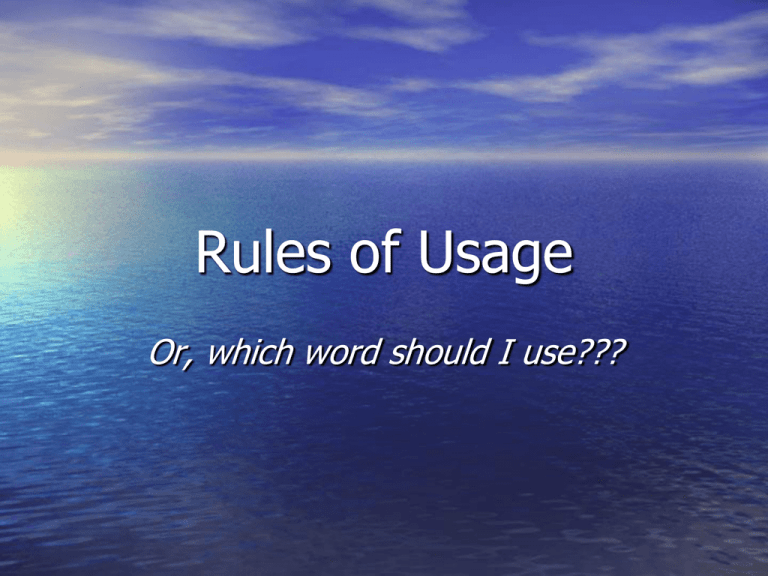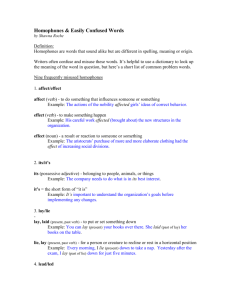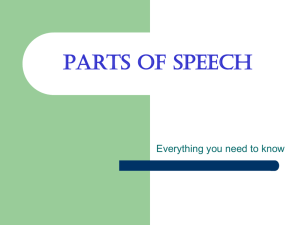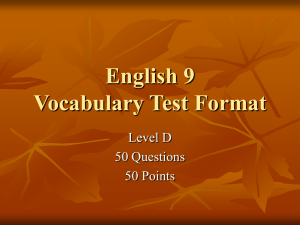Or, which word should I use???
advertisement

Rules of Usage Or, which word should I use??? ACCEPT/EXCEPT • “If you offer me Almond Roca candies, I will gladly accept them—except for the peppermintflavored ones.” • Just remember that the “X” in “except” excludes things — they tend to stand out, be different. In contrast, just look at those two cozy “C’s” - very accepting, always willing to receive. ADAPT/ADOPT • You can adopt a child or a custom or a law; in all of these cases you are making the object of the adoption your own, accepting it. • If you adapt something, you are changing it. • “After a couple adopts a child, they must adapt to a new lifestyle.” AFFECT/EFFECT • “Affect” is usually a verb meaning to have an influence on: “The large donation from the industrialist did not affect my vote for the Clean Air Act.” It can also mean “to make a display of or deliberately cultivate,” as when a pretentious person is said to “affect” an artificial air of sophistication. • “Effect” is most commonly used as a noun to mean result: “When I left the stove on, the effect was that the house filled with smoke.” • “When you affect a situation, you have an effect on it.” • Less commonly, “effect” is a verb meaning “to create or bring about”: “I’m trying to effect a change in the way we elect our president.” Note especially that the proper expression is not “take affect” but “take effect”—become effective. • Even less commonly, when the word “affect” is accented on the first syllable (AFF-ect), it is a noun meaning “emotion.” In this case the word is used mostly by psychiatrists and social workers. Quick Quiz: Affect vs. Effect 1. The __________of the antibiotic on her infection was 2. 3. 4. 5. 6. surprising. I did not know that antibiotics could _______ people so quickly. Plastic surgery had an __________, not only on her appearance, but on her self-esteem. If the chemotherapy has no ________, should she get surgery for the tumor? When will we know if the treatment has _______ long-term prognosis? We cannot ________ a new policy without the board of directors voting on it first. ALL READY/ALREADY • “All ready” is a phrase meaning completely prepared, as in “As soon as I put my coat on, I will be all ready.” • “Already” is an adverb used to describe something that has happened before a certain time, as in “What do you mean you’d rather stay home? I’ve already got my coat on.” ALOT/ALLOT/A LOT • First, “alot” is NOT a word. • To “allot” is to designate an amount of something for a certain purpose: “I am going to allot you ten minutes in class to work on your homework.” • “A lot” means a sufficient or plentiful amount: “He ate a lot of Halloween candy.” AMOUNT/NUMBER • This is a vast subject: “I will try to limit the number of words I expend on it so as not to use up too great an amount of space.” • Amount words relate to quantities of things that are measured in bulk; number to things that can • be counted. In the sentence above, it would have been improper to write “the amount of words” because words are discrete entities which can be counted, or numbered. A few more insights … • Here is a handy chart to distinguish the two categories of words: Amount quantity little less much Number number few fewer many • You can eat fewer cookies, but you drink less milk. If you eat too many cookies, people would probably think you’ve had too much dessert. • If the thing being measured is being considered in countable units, then use number words. Even a substance which is considered in bulk can also be measured by number of units. For instance, you shouldn’t drink too much soda, but you should also avoid drinking too many glasses of soda. Note that here you are counting glasses. They can be numbered. So much to say on this … • The most common mistake of this kind is to refer to an “amount” of people instead of a “number” of people. • Exceptions to the less/fewer pattern are references to units of time and money, which are usually treated as amounts: less than an hour, less than five dollars. Only when you are referring to specific coins or bills would you use fewer: “I have fewer than five state quarters to go to make my collection complete.” Quick Quiz: Amount vs. Number 1. I can’t believe the _______ of homework 2. 3. 4. 5. we have in this class! The _________ of assignments is huge! We also read a large ________ of books. The _______ of writing is especially large when essays are due. It’s a good thing the _______ of essays has gone down from past years. A WHILE/AWHILE • When “awhile” is spelled as a single word, it is an adverb meaning “for a time” (“stay awhile”). • When “while” is the object of a prepositional phrase, as in “Lend me your hammer for a while,” the “while” must be separated from the “a.” BESIDE/BESIDES • “Besides” can mean in addition to, as in: “Besides the puppy chow, Spot ate the steak I was going to serve for dinner.” • “Beside,” in contrast, usually means next to. For example, “I sat beside Cheryl all evening, but she kept talking to Jerry instead.” BETWEEN/AMONG • Use “between” to refer to two items; use “among” when there are more than two. • “She was standing between the bushes among the many flowers.” • “She was the top speller among the students in her class.” • “The contest was between Joe and John.” Between you and I • This is considered incorrect English; you need to use an object pronoun after a preposition. • “Just between you and me, I heard that you got the job.” • “I had to choose between him and her.” • “They contacted both us and them.” CAPITAL/CAPITOL • A “capitol” is almost always a building. • Cities which serve as seats of government are capitals spelled with an A in the last syllable, as • are most other uses of the word as a common noun. The only exceptions are place names alluding to capitol buildings in some way or other, like “Capitol Hill” in Washington, D.C. It might help to remember that Congress with an O meets in the Capitol with another O. CITE/SITE/SIGHT • You cite (document) the author in an endnote or include a Works Cited page; you visit a Web site or the site (location) of the crime, and you sight (see) your beloved running toward you in slow motion on the beach (a sight for sore eyes!). • You travel to see the sights. It’s not called “siteseeing” but sightseeing. CREDIBLE/CREDULOUS • “Credible” means “believable” or “trustworthy.” • It is also used in a more abstract sense, meaning something like “worthy”: “She made a credible lyric soprano.” Don’t confuse “credible” with “credulous,” a much rarer word which means “gullible.” DECENT/DESCENT/DISSENT • “Decent” (rhymes with “recent”) is used to label • • actions, things, or people that are respectable, appropriate, satisfactory, or kind. The word to use when discussing ancestry is “descent” (rhymes with “we sent”). Somebody whose ancestors came from Brazil is of Brazilian descent. You also make a “descent” down a mountain. Occasionally this latter word is confused with “dissent,” which means “disagreement.” EVERYONE/EVERY ONE • “Everyone” means “everybody” and is used when you want to refer to all the people in a group: “Everyone in my family likes spaghetti.” • But if you’re referring to the individuals who make up a group, then the phrase is “every one.” Examples: “God bless us, every one” (may each individual in the group be blessed). “We wish each and every one of you a Merry Christmas” (every single one of you). In the phrase “each and every one,” you should never substitute “everyone”. FARTHER/FURTHER • Some authorities insist on “farther” to refer to physical distance and on “further” to refer to an extent of time or degree, but others treat the two words as interchangeable except for insisting on “further” for “in addition” and “moreover.” You’ll always be safe in making the distinction; some people get really testy about this. FORMALLY/FORMERLY • These two are often mixed up in speech. If you are doing something in a formal manner, you are behaving formally; but if you previously behaved differently, you did so formerly. • For example: “Formerly, boys wore simple suits to Coronation, but now they often dress more formally in tuxes.” GOOD/WELL • You do something “well,” but a thing is “good.” • • The exception is verbs of sensation in phrases such as “the pie smells good,” or “I feel good.” Saying “the pie smells well” would imply that the pastry in question had a nose. Similarly, “I feel well” is also acceptable, especially when discussing health, but it is not the only correct usage. HANGED/HUNG • Originally these words were pretty much interchangeable, but “hanged” eventually came to be used pretty exclusively to mean “executed by hanging.” • Except in cases of execution or suicide, “hung” is the correct form of the word: “Lady Wrothley saw to it that her ancestors’ portraits were properly hung.” HOLE/WHOLE • “Hole” and “whole” have almost opposite meanings. A hole is a lack of something, like the hole in a doughnut. • “Whole” means things like entire, complete, and healthy and is used in expressions like “the whole thing,” “whole milk,” “whole wheat,” and “with a whole heart.” IDLE/IDOL • Something or someone inactive is idle. The word can also mean “lazy” (“the idle rich”). Unemployed workers are said to be idle, fired ones to have been idled. A car engine can idle. • Someone you admire or something you worship is an idol. Also, former contestants on “American Idol” are idols, whether you like them or not! Incredible/Incredulous • Incredible means “unbelievably great or fantastic”; incredulous, “disbelieving or skeptical” • “He was incredulous” means “he didn’t believe it,” whereas “he was incredible” means “he was wonderful” (but use the latter expression only in casual speech). INTO/IN TO • “Into” is a preposition which often answers the question, “where?” For example, “Tom and Becky had gone far into the cave before they realized they were lost.” Sometimes the “where” is metaphorical: “She went into business.” It can also refer to time: “The snow lingered on the ground well into April.” • In other instances where the words “in” and “to” just happen to find themselves neighbors, they must remain separate words. For instance, “Rachel dived back in to rescue the struggling boy.” Here “to” belongs with “rescue” and means “in order to,” not “where.” (If the phrase had been “dived back into the water,” “into” would be required.) ITS/IT’S • The exception to the general rule that one • should use an apostrophe to indicate possession is in possessive pronouns (its, his, hers, ours, theirs). The problem with avoiding “it’s” as a possessive is that this spelling is perfectly correct as a contraction meaning “it is.” Just remember one point and you’ll never make this mistake again: “it’s” always means “it is” or “it has” and nothing else. LAY/LIE • You lay down the book you’ve been reading, but you lie • • down when you go to bed. In the present tense, if the subject is acting on some other object, it’s “lay.” If the subject is lying down, then it’s “lie.” This distinction is often not made in informal speech, partly because in the past tense the words sound much more alike: “He lay down for a nap,” but “He laid down the law.” If a helping verb is involved, you need the past participle forms. “Lie” becomes “lain” and “lay” becomes “laid”: “He had just lain down for a nap,” and “His daughter had laid the blanket on him.” Tenses Present Lay (put/place) Lie (recline) Lie (not tell truth) Past Laid Lay Lied Perfect Has Laid Has Lain Has Lied Quick Practice: Lay vs. Lie 1. She wants to ____ on the beach and get a tan. 2. Yesterday she ____ in the sun too long and got 3. 4. 5. a sunburn. You should always _____ a towel on the sand before you ____ down. If she had _____ a towel down, she would not have gotten so sandy. It’s been a long time since I have _____ on a sunny beach and read a book. LET’S/LETS • The only time you should spell “let’s” with an apostrophe is when it means “let us”: “Let’s go to the mall.” • If the word you want means “allows” or “permits,” no apostrophe should be used: “My mom lets me use her car if I fill the tank.” LOSE/LOOSE • This confusion can easily be avoided if you pronounce the word intended aloud. If it has a voiced Z sound, then it’s “lose.” If it has a hissy S sound, then it’s “loose.” • Here are examples of correct usage: “He tends to lose his keys.” “She lets her dog run loose.” Note that when “lose” turns into “losing,” it loses its “E.” NOONE/NO ONE • Noone only exists in Old English: “Shall we meet at Ye Olde Sandwyche Shoppe at Noone?” • “No one” is always two separate words, unlike “anyone” and “someone.” PASSED/PAST • If you are referring to a distance or a period of time • • before now, use “past”: “The police car drove past the suspect’s house” (distance) or “The team performed well in the past” (time). If you are describing the action of passing, you need to use “passed“: “When John passed the gravy, he spilled it on his lap.” “The teacher was astonished that none of the students had passed the test.” “After a brief illness, he passed away.” “Past” can be an adjective, a noun, a preposition, or an adverb, but never a verb. If you need to write the past tense of the verb “to pass,” use “passed.” PEACE/PIECE • Peace refers to a calmness of spirit or atmosphere; piece, to a part or portion of something. • “Piece” has the word “pie” buried in it, which should remind you of the familiar phrase, “a piece of pie.” You can meditate to find peace of mind, or you can get angry and give someone a piece of your mind. • Classical scholars will note that pax is the Latin word for peace, suggesting the need for an “A” in the latter word. PRECEDE/PROCEED • “Precede” means “to go before.” • “Proceed” means to go on. • For example: “Let your companion precede you through the door, then proceed to follow her.” PRINCIPAL/PRINCIPLE • Remember: “Your school principal is your pal.” • “Principal” is a noun and adjective referring to • someone or something which is highest in rank or importance. (In a loan, the principal is the more substantial part of the money, the interest is—or should be—the lesser.) “Principle” is only a noun, and has to do with law or doctrine: “The workers fought hard for the principle of collective bargaining.” REAL/REALLY • “Real” is an adjective meaning true, actual, or genuine. “Really” is an adverb meaning truly, very, or extremely. • While the correct adverbial form is “really” rather than “real,” even that form is generally confined to casual speech, as in “When you complimented me on my speech I felt really great!” In general, “really” is a feeble qualifier. • Usually, it is better to replace the expression altogether with something more precise: “almost seven feet tall” is better than “really tall.” To strive for intensity by repeating “really,” as in “That dessert you made was really, really good,” demonstrates an impoverished vocabulary. SENSE/SINCE • “Sense” is a verb meaning “feel” (“I sense you near me”) or a noun meaning “intelligence” (“have some common sense!”). • Don’t use it when you need the adverb “since” (“since you went away,” “since you’re up anyway, would you please let the cat out?”). SO … THAT/VERY • Originally people said things like, “I was so delighted • • with the wrapping that I couldn’t bring myself to open the package.” But then they began to lazily say “You made me so happy,” no longer explaining just how happy that was. This pattern of using “so” as a simple intensifier meaning “very” is now standard in casual speech, but is out of place in formal writing, where “very” or another intensifier works better. Without vocal emphasis, the “so” conveys little in print; in formal writing, it should be paired with “that” THAN/THEN • When comparing one thing with another, you may find that one is more appealing “than” another. “Than” is the word you want when doing comparisons. • If you are talking about time, choose “then“: “First you separate the eggs; then you beat the whites.” • Alexis is smarter than I, not “then I.” THEY’RE/THEIR/THERE • There is ALWAYS a contraction of “they are.” If you’ve • • • written “they’re,” ask yourself whether you can substitute “they are.” If not, you’ve made a mistake. “Their” is a possessive pronoun like “her” or “our” “They eat their hotdogs with sauerkraut.” Everything else is “there.” “There goes the ball, out of the park! See it? Right there! There aren’t very many home runs like that.” Another hint: “there” has “here” buried inside it to remind you it refers to place, while “their” has “heir” buried in it to remind you that it has to do with possession. THREW/THROUGH • “Threw” is the past tense of the verb “throw”: “The pitcher threw a curve ball.” • “Through” is never a verb: “The ball came through my living room window.” • Unless your sentence involves someone throwing something—even figuratively, as in “she threw out the idea casually”— the word you want is “through.” TO/TOO/TWO • People seldom mix “two” up with the other two; it • • obviously belongs with words that also begin with TW, like “twice” and “twenty” that involve the number 2. But the other two are confused all the time. Just remember that the only meanings of “too” are “also” (“I want some ice cream too.”) and “in excess” (“Your iPod is playing too loudly.”). Note that extra O. It should remind you that this word has to do with adding more on to something. “To” is the proper spelling for all the other uses. WEATHER/WETHER/WHETHER • The climate is made up of “weather”; whether it is nice out depends on whether it is raining or not. • A wether is just a castrated sheep; there should be no time you ever need to use this word in this class! WHO/WHOM • “Whom” has been dying an agonizing death for decades— • • many people never use the word in speech at all. However, in formal writing, critical readers still expect it to be used when appropriate. The distinction between “who” and “whom” is basically simple: “who” is the subject form of this pronoun, and “whom” is the object form. “Who was wearing that awful dress at the Academy Awards banquet?” is correct because “who” is the subject of the sentence (Ask yourself, can you replace it with “he” or “she”?). “The MC was so startled by the neckline that he forgot to whom he was supposed to give the Oscar” is correct because “whom” is the object of the preposition “to” (think, can you replace it with “him” or “her”?) More on Who/Whom … • Now consider this sort of question: “Who are you staring at?” Although strictly speaking the pronoun should be “whom,” it is very rarely used even by careful speakers as the first word in a question, and many authorities have now conceded the point. • There is another sort of question in which “whom” appears later in the sentence: “I wonder whom he bribed to get the contract?” This may seem at first similar to the previous example, but here “whom” is not the subject of any verb in the sentence; rather, it is part of the noun clause which itself is the object of the verb “wonder.” Quick Quiz: Who vs. Whom 1. 2. 3. 4. 5. 6. 7. Is she the one ____ spoke to you? Yes, she is the one _____ I spoke to. I’m not sure ____ sent me this package. She is the one _____ bought the car. _____ should I ask to the dance? Cedric hasn’t decided _____ should be appointed yet. I’m looking for an assistant on _____ I can depend. WHO’S/WHOSE • This is one of those cases where it is important • • to remember that possessive pronouns never take apostrophes, even though possessive nouns do. “Who’s” always and forever means only “who is,” as in “Who’s that guy with the droopy mustache?” or “who has,” as in “Who’s been eating my porridge?” “Whose” is the possessive form of “who” and is used as follows: “Whose dirty socks are these on the breakfast table?” YOUR/YOU’RE • “You’re” is always a contraction of “you are.” If you’ve written “you’re,” try substituting “you are.” If it doesn’t work, the word you want is “your.” Your writing will improve if you’re careful about this. • If someone thanks you, write back “you’re welcome” for “you are welcome.”









